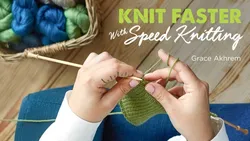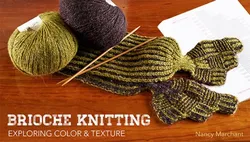
Essential Skills for Sweater Knitting 
Explore the essentials of Essential Skills for Sweater Knitting ▼
ADVERTISEMENT
Course Feature
![]() Cost:
Cost:
Paid
![]() Provider:
Provider:
Craftsy
![]() Certificate:
Certificate:
Paid Certification
![]() Language:
Language:
English
![]() Start Date:
Start Date:
On-Demand
Course Overview
❗The content presented here is sourced directly from Craftsy platform. For comprehensive course details, including enrollment information, simply click on the 'Go to class' link on our website.
Updated in [March 09th, 2023]
In Essential Skills for Sweater Knitting, designer Anne Hanson will provide students with the fundamental techniques and tips for perfect handknit sweaters. Students will learn how to choose and follow the sweater pattern that’s right for their skill level and style preference, select the yarn and tools they need for the results they want, and modify the fit of their sweater. Additionally, students will learn how to knit their pieces and seam them together cleanly, as well as some fabulous finishing tips that will make for polished projects.
[Applications]
After taking this course, participants can apply the skills they have learned to knit sweaters of their own design. They can use the techniques taught to select the right pattern, yarn, and tools for their project, as well as modify the fit of the sweater. Additionally, they can use the tips provided to knit and seam the pieces together, and finish the project with a polished look.
[Career Paths]
1. Sweater Designer: Sweater designers create patterns for sweaters and other knitwear. They must have a good understanding of the construction of sweaters and be able to create patterns that are both stylish and easy to follow. As the fashion industry continues to evolve, sweater designers must stay up to date on the latest trends and be able to create patterns that are both fashionable and functional.
2. Knitting Technician: Knitting technicians are responsible for operating and maintaining knitting machines. They must be able to troubleshoot any issues that arise and be able to make adjustments to the machines as needed. As technology continues to advance, knitting technicians must stay up to date on the latest machines and techniques in order to ensure that the machines are running efficiently.
3. Technical Knitting Designer: Technical knitting designers are responsible for creating patterns for knitwear that are both stylish and functional. They must have a good understanding of the construction of knitwear and be able to create patterns that are both fashionable and easy to follow. As the fashion industry continues to evolve, technical knitting designers must stay up to date on the latest trends and be able to create patterns that are both fashionable and functional.
4. Knitting Instructor: Knitting instructors are responsible for teaching others how to knit. They must have a good understanding of the basics of knitting and be able to teach others how to knit in a way that is both fun and informative. As the popularity of knitting continues to grow, knitting instructors must stay up to date on the latest trends and techniques in order to ensure that their students are learning the most up to date information.
[Education Paths]
1. Bachelor of Science in Textile Science: This degree program focuses on the science and technology of textiles, including the design, production, and use of fabrics. Students learn about the properties of fibers, yarns, and fabrics, as well as the processes used to create them. They also learn about the chemistry and physics of textiles, as well as the environmental and economic impacts of the textile industry. This degree is becoming increasingly important as the demand for sustainable and ethical textiles grows.
2. Master of Science in Fashion Design: This degree program focuses on the design and production of clothing and accessories. Students learn about the history of fashion, the principles of design, and the techniques used to create garments. They also learn about the business of fashion, including marketing, merchandising, and retailing. This degree is becoming increasingly important as the fashion industry moves towards more sustainable and ethical practices.
3. Bachelor of Arts in Apparel Design: This degree program focuses on the design and production of apparel, including clothing, footwear, and accessories. Students learn about the history of apparel, the principles of design, and the techniques used to create garments. They also learn about the business of apparel, including marketing, merchandising, and retailing. This degree is becoming increasingly important as the apparel industry moves towards more sustainable and ethical practices.
4. Master of Science in Textile Engineering: This degree program focuses on the engineering and technology of textiles, including the design, production, and use of fabrics. Students learn about the properties of fibers, yarns, and fabrics, as well as the processes used to create them. They also learn about the chemistry and physics of textiles, as well as the environmental and economic impacts of the textile industry. This degree is becoming increasingly important as the demand for sustainable and ethical textiles grows.
Course Provider

Provider Craftsy's Stats at AZClass
Discussion and Reviews
0.0 (Based on 0 reviews)
Explore Similar Online Courses

CP-SAT - Certified Professional Selenium Automation Testing

Critical criminology and the social sciences

Python for Informatics: Exploring Information

Social Network Analysis

Introduction to Systematic Review and Meta-Analysis

The Analytics Edge

DCO042 - Python For Informatics

Causal Diagrams: Draw Your Assumptions Before Your Conclusions

Whole genome sequencing of bacterial genomes - tools and applications

Special Techniques for Machine Knitting: Color & Texture

Speed Knitting With Combined Continental


Start your review of Essential Skills for Sweater Knitting